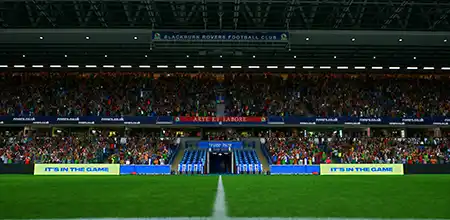Ewood Park
| Official Stadium Name | Ewood Park |
| Former Names | |
| Alternative Names | Blackburn Rovers Football Club Stadium |
| Inauguration Date | 13/09/1890 |
| Opening Game | Blackburn Rovers |
| Opening Game Date | 13/09/1890 |
| Attendance Record | 62522 |
| Record Match | Blackburn Rovers |
| Record Date | 02/03/1929 |
| Renovations | 1913, 1928, 1955, 1988, 1995 |
| Design | John Madin |
| Cost | |
| Owner | |
| Operator | |
| Tenants | |
| League | |
| Pitch Dimension | 105x68 meters |
| Surface |
In-Game Details
In-Game Video

Real Video
Stadium History
Ewood Park is a football stadium in Blackburn, Lancashire, England, and the home of Blackburn Rovers F.C., founding members of the Football League and Premier League, who have played there since 1890. The stadium has a seating capacity of 31,367 and is divided into four main sections: the Bryan Douglas Darwen End, the Ronnie Clayton Blackburn End, the Riverside Stand, and the Jack Walker Stand, named after the club’s former owner and supporter. The site has hosted football since at least 1881, with significant developments occurring throughout the 20th century, including the construction of various stands and improvements in stadium facilities.
The stadium underwent major redevelopment in the early 1990s under the ownership of Jack Walker, transforming it into a modern, all-seater venue. This included the rebuilding of three stands and the opening of the new Jack Walker Stand in 1994. Ewood Park has also been used for various other events, including international football matches, rugby league tests, and concerts. Notably, it was registered as an Asset of Community Value in 2014 and continues to serve as a key venue for both sports and community events in the region.

 EFL Championship
EFL Championship

 Sunny
Sunny Rainy
Rainy Cloudy
Cloudy







